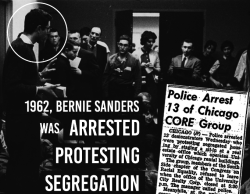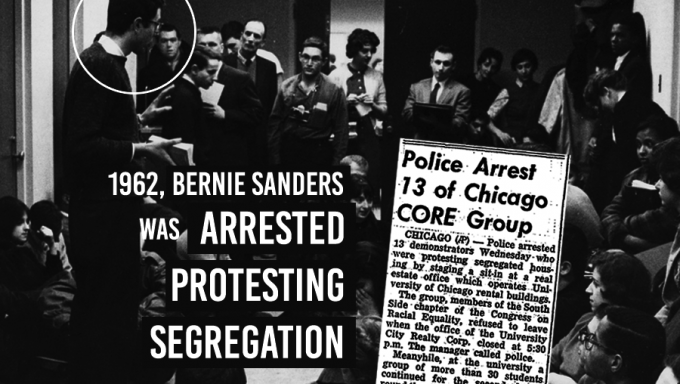
Bernie Sanders has a remarkable history of being on the right side of the important civil rights battles of the day. Has he been perfect, of course not, but the smear that he has been absent on issues that matter to African American communities and all people of color seems to be unfair.
Of course, Sanders, and his supporters, need to do a better job to connect with black and brown voters. Votes must be earned and can’t be taken for granted. African American luminaries like Cornel West and Ta-Nehisi Coates, feel that Bernie Sanders has earned their votes after careful consideration and Michelle Alexander, author of The New Jim Crow, argues that black voters shouldn’t just automatically vote for Hillary Clinton as part of the Clinton legacy is helping create the era of mass incarceration that the Clintons now disavow.
I loathe to ever disagree with civil rights icon and hero John Lewis, a man who bears the scars of our nation’s racist past, but his dismissive attitude towards the activism of Senator Sanders seems unduly harsh and unfair. Mother Jones has a great rundown of the actual work that Bernie Sanders did during the 1960s Civil Rights Movement:
Although Sanders did attend the 1963 March on Washington, at which Lewis spoke, most of his work was in and around Hyde Park, where he became involved with the campus chapter of CORE shortly after transferring from Brooklyn College in 1961. During Sanders’ first year in Chicago, a group of apartment-hunting white and black students had discovered that off-campus buildings owned by the university were refusing to rent to black students, in violation of the school’s policies. CORE organized a 15-day sit-in at the administration building, which Sanders helped lead. (James Farmer, who co-founded CORE and had been a Freedom Rider with Lewis, came to the University of Chicago that winter to praise the activists’ work.) The protest ended when George Beadle, the university’s president, agreed to form a commission to study the school’s housing policies.
Sanders was one of two students from CORE appointed to the commission, which included the neighborhood’s alderman and state representative, in addition to members of the administration. But not long afterward, Sanders blew up at the administration, accusing Beadle of reneging on his promise and refusing to answer questions from students on its integration plan. In an open letter in the student newspaper, the Chicago Maroon, Sanders vented about the double-cross.
***
Sanders left his leadership role at the organization not long afterward; his grades suffered so much from his activism that a dean asked him to take some time off from school. (He didn’t take much interest in his studies, anyway.) But he continued his activism with CORE and SNCC. In August of 1963, not long after returning to Chicago from the March on Washington, Sanders was charged with resisting arrest after protesting segregation at a school on the city’s South Side.
Today, people of color and the poor in general, bear the brunt of the horrible Drug War. Senator Sanders has spoken at great lengths about the failure of the War on Drugs and has already filed bills to repeal cannabis prohibition and end the use of federal private prisons. The anti-establishment candidate’s criminal and racial justice platform is rather impressive.
I’m not “Bernie-splaining” to black voters, or anyone for that matter, as I don’t believe that anyone gets a pass just because they were on the right side of history when they marched with Dr. Martin Luther King, Jr., or got arrested protesting segregation, or opposed the Vietnam War, or supported marriage equality, or voted against the Iraq War, or filed a bill that would end federal marijuana prohibition. However, I do argue that such a candidate shouldn’t be dismissed offhand and should be given careful consideration based upon their history and present policy positions.







